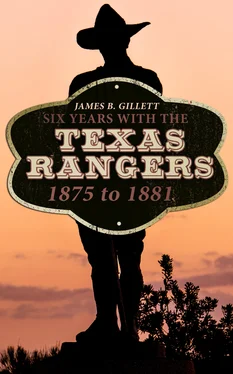James B. Gillett - Six Years With the Texas Rangers - 1875 to 1881
Здесь есть возможность читать онлайн «James B. Gillett - Six Years With the Texas Rangers - 1875 to 1881» — ознакомительный отрывок электронной книги совершенно бесплатно, а после прочтения отрывка купить полную версию. В некоторых случаях можно слушать аудио, скачать через торрент в формате fb2 и присутствует краткое содержание. Жанр: unrecognised, на английском языке. Описание произведения, (предисловие) а так же отзывы посетителей доступны на портале библиотеки ЛибКат.
- Название:Six Years With the Texas Rangers: 1875 to 1881
- Автор:
- Жанр:
- Год:неизвестен
- ISBN:нет данных
- Рейтинг книги:3 / 5. Голосов: 1
-
Избранное:Добавить в избранное
- Отзывы:
-
Ваша оценка:
- 60
- 1
- 2
- 3
- 4
- 5
Six Years With the Texas Rangers: 1875 to 1881: краткое содержание, описание и аннотация
Предлагаем к чтению аннотацию, описание, краткое содержание или предисловие (зависит от того, что написал сам автор книги «Six Years With the Texas Rangers: 1875 to 1881»). Если вы не нашли необходимую информацию о книге — напишите в комментариях, мы постараемся отыскать её.
Six Years With the Texas Rangers: 1875 to 1881 — читать онлайн ознакомительный отрывок
Ниже представлен текст книги, разбитый по страницам. Система сохранения места последней прочитанной страницы, позволяет с удобством читать онлайн бесплатно книгу «Six Years With the Texas Rangers: 1875 to 1881», без необходимости каждый раз заново искать на чём Вы остановились. Поставьте закладку, и сможете в любой момент перейти на страницу, на которой закончили чтение.
Интервал:
Закладка:
James B. Gillett
Six Years With the Texas Rangers: 1875 to 1881
e-artnow, 2021
Contact: info@e-artnow.org
EAN: 4066338129932
Table of Contents
Chapter I. The Making of a Ranger
Chapter II. The Texas Rangers
Chapter III. I Join The Rangers
Chapter IV. My First Brush with Indians
Chapter V. The Mason County War
Chapter VI. Major Jones and His Escort
Chapter VII. The Horrell-higgins Feud
Chapter VIII. Service with Reynolds, the Intrepid
Chapter IX. Sam Bass and His Train Robber Gang
Chapter X. A Winter of Quiet and a Transfer
Chapter XI. The Salt Lake War and a Long Trek
Chapter XII. Our First Fight with Apaches
Chapter XIII. Scouting in Mexico
Chapter XIV. Treacherous Braves, a Faithful Dog, and a Murder
Chapter XV. Victorio Becomes a Good Indian
Chapter XVI. Some Undesirable Recruits
Chapter XVII. Last Fight Between Rangers and Apaches
Chapter XVIII. An International Episode
Chapter XIX. Last Scoutings
Chapter XX. Fruits of Ranger Service
CHAPTER I
THE MAKING OF A RANGER
Table of Contents
The greatest shaping force in human life is heredity, and from my father I inherited my love of the open frontier and its life of danger and excitement. This inheritance was further strengthened by environment and training, and finally led me to embrace the life of the Texas Ranger. My father, James S. Gillett, was himself a frontiersman, though born in the quieter, more settled east. At a very early age his parents emigrated from his birthplace in Kentucky and moved to Missouri. Here, after a short time, they died and the young orphan lived with a brother-in-law. When still quite a youth my father, with three other adventurous Missourians, set out on an expedition to Santa Fe, New Mexico. While passing through Indian Territory, now the State of Oklahoma, the little party was captured by the Osage Indians. Fortunately for the youngsters, their captors did them no harm, but turned them loose after two weeks' imprisonment in the redskin camp.
Despite this first setback my father persevered and reached Santa Fe. Here he lived several years and mastered the Spanish language. Not long afterward the emigrating fever again caught him up and he journeyed to Van Buren, Arkansas. While living there he studied law and was admitted to the bar. Shortly thereafter he removed to Paris, Texas, from which he was elected to the Texas Legislature as representative for Lamar and adjoining counties.
When Texas entered the Union and brought on the Mexican War with the United States, my father enlisted in 1846 and rose to the rank of major. In 1854 he was Adjutant-General of Texas. Between 1859 and 1860, during the governorship of Sam Houston, my father was quartermaster of a battalion of rangers, thus making it natural that I should also feel drawn toward this famous organization.
At the beginning of the Civil War my father was beyond military age,—he was born in 1810—but as the South became hard pressed for men he enlisted in the spring of 1864 and served in Captain Carington's company until the end of the war.
In 1850, a few years before he became Adjutant General, my father married Miss Bettie Harper, then a resident of Washington County, Texas. My mother's father, Captain Harper, was a southern planter who emigrated from North Carolina between 1846 and 1848, and, settling in Washington County, established a Dixie plantation with a hundred slaves. My mother was a highly cultivated and refined woman. On her marriage she brought several negro servants with her to her new home in Austin. Of her union with my father five children were born. The first two, both boys, died in infancy. I was the fourth child born to my parents, and first saw the light of day in Austin, Texas, on November 4, 1856. An older sister, Mary, and a younger, Eva, survived to adulthood.
At the close of the Civil War my father returned to his family pretty well broken in health and probably also in spirit. His slaves were all freed and his land holdings, about two hundred acres of cedar land, some five or six miles from Austin, and a tract of pine land in Grimes County, Texas, were not very productive. There was not much law practice in Austin in the early post-war days, but my father set to work resolutely to provide for his family. Though I did not realize it then, I now know that he had a hard struggle. I was only eight and a half years old when father returned to us from the Confederate Army, but I remember he used to amuse himself by relating to us vivid accounts of his Indian fighting and frontier adventures. What heredity gave me a predilection for was strengthened by these narratives, and I early conceived a passionate desire to become a frontiersman and live a life of adventure.
* * * * *
In those early days in Texas there were no free schools in Austin, so my father sent the three of us, Mary, Eva, and myself, to the pay schools. None of these was very good, and I lost nearly two years at a German school, trying to mix German and English. I have never been of a studious nature—the great out of doors always called to me, and I found the desk's dead wood particularly irksome. When school closed in the early summer of 1868, like some of Christ's disciples, I went fishing and never attended school an hour thereafter. For books I substituted the wide-open volume of nature and began the life of sport and freedom that was to prepare me later for service with the rangers.
As poor as he was my father always kept a pony, and I learned to ride almost before I could walk. Raised on the banks of the Colorado River, I learned to swim and fish so long ago that I cannot now remember when I was unable to do either. I fished along the river with a few hand lines and used to catch quantities of gaspergou or drums. These were fine fish and sold readily on the streets of Austin, so I soon saved money enough to buy a small skiff or fishing boat. I now bought a trot line with a hundred hooks and began fishing in real earnest. About five or six miles below Austin on the Colorado was Mathews' mill. Just below the dam of this mill the fishing was always good, and here I made my fishing grounds. I had a large dry goods box with inch auger holes bored in it. This box, sunk in the river and secured by a rope tied to a stob, made a capital trap, and into it I dropped my fish as they were caught. In this way I kept them alive and fresh until I had enough to take into town.
Many free negroes were farming along the banks of the Colorado, and I would hire a pony of them for twenty-five cents a trip when I was ready to take my catch into town. Many times I have left the river by starlight and reached the Old Market House at Austin at dawn, spread out a gunny sack, bunch my fish and be ready for the first early marketers. I kept up my fishing until the fish stopped biting in the fall of 1868.
Confederate soldiers returning home from the war brought with them many old Enfield muskets. These were smooth bore and chambered one large ball and three buckshot. These old guns, loaded with small shot, were fine on birds and squirrels, but they had one serious objection—they would kick like a mule. As the boys used to say, they "would get meat at both ends!" A day's shooting with one of these muskets would leave one's shoulder and arm black and blue for a week.
When fishing failed I decided to become a hunter, and bought one of these old guns for $3.50. It was as long as a fence rail, and at my age I could not begin to hold it out and shoot off hand, so I had to use a rest. The Enfield musket had the longest barrel I ever saw on a gun, and the hammer was as long as a man's hand. I could cock my gun with both hands, but if I failed to get a shot I was not strong enough to let the hammer down without letting it get away, so I had to carry it cocked to keep from losing the cap. I would take it off the tube and put it in my pocket until I had a chance for another shot. I remember once when I cocked my musket I could see no cap on the tube and, thinking it had fallen off, I pulled the trigger. The cap had stuck up in the old hammer and the gun roared like a cannon. I was always sure to look for the cap after this. I did not make much headway using this kind of weapon, but it taught me the use and danger of firearms,—a knowledge I was to find very useful in later years.
Читать дальшеИнтервал:
Закладка:
Похожие книги на «Six Years With the Texas Rangers: 1875 to 1881»
Представляем Вашему вниманию похожие книги на «Six Years With the Texas Rangers: 1875 to 1881» списком для выбора. Мы отобрали схожую по названию и смыслу литературу в надежде предоставить читателям больше вариантов отыскать новые, интересные, ещё непрочитанные произведения.
Обсуждение, отзывы о книге «Six Years With the Texas Rangers: 1875 to 1881» и просто собственные мнения читателей. Оставьте ваши комментарии, напишите, что Вы думаете о произведении, его смысле или главных героях. Укажите что конкретно понравилось, а что нет, и почему Вы так считаете.












